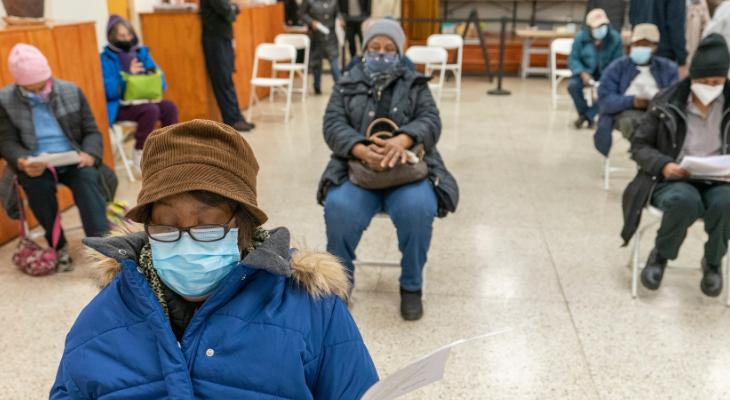Evangelical Christian and Orthodox Jewish Leaders Offer Spaces for Vaccine Distribution
January 28, 2021

WASHINGTON (RNS) — Two national religious groups, one evangelical Christian, the other Orthodox Jewish, have teamed up to offer their sacred spaces for vaccine distribution, hoping to assist government officials and private companies in the effort to combat the ongoing pandemic.
In a recent editorial, Walter Kim, president of the National Association of Evangelicals, and Rabbi Moshe Hauer, executive vice president of the Orthodox Union, made their pitch to help “anyone in need of vaccination, whether or not they are members of our congregations or of our neighborhoods.”
“We would welcome the opportunity for many of our facilities to serve as vaccination sites,” the USA Today editorial read.
The two asked that Americans “allow us to help you with coordinating appointments, and/or to provide you with the medically trained volunteers to administer the shots. We can also work with you to spread awareness to our communities about the importance of the vaccines.”
They added: “Aside from the logistical benefits, members of our communities will feel reassured if they can come to their neighborhood houses of faith for the vaccination.”
The effort is part of a larger movement among faith groups to aid others during the pandemic and assist with vaccination rollout.
“We feel like we have a lot to offer,” Hauer said in an interview with Religion News Service.
He argued that “everything” about his faith compels him to contribute to the historic vaccination effort, saying his tradition teaches not only that “our own lives as the greatest gift from God,” but also that it’s a “religious obligation” to care for the well-being of others.
A vaccine, Hauer explained, helps accomplish both goals, and there are practical benefits to using houses of worship as distribution sites.
“Many people haven’t wandered far from their homes for a year, and it might be a little easier for them to go to a familiar house of faith in their neighborhood than a convention center,” he said.
He also noted that getting a shot can be “scary for people,” but that getting it “in familiar terrain, in a place that is built to provide people who come with a sense of safety and confidence” could help minimize vaccine hesitancy.
Before the USA Today op-ed, the Orthodox Union, NAE and other faith groups extended a similar offer to the incoming administration during a Jan. 7 meeting between several religious organizations and various Biden transition team officials, such as his COVID Equity Task Force chair and his picks for U.S. Health and Human Services secretary and surgeon general.
The religious leaders say they have not heard back from Biden’s team, and the White House did not respond to requests for comment for this article.
But Hauer’s group has also been in contact with state officials, and government representatives in New York and New Jersey have already expressed interest. According to Hauer, the Orthodox Union gave officials from both states a list of their affiliated houses of worship that have the necessary equipment to store and provide vaccines, such as proper refrigeration.
Both the NAE and the Orthodox Union have been in contact with major pharmacies as well, such as CVS and Walgreens. Hauer said the companies seemed particularly interested in using religious facilities in areas that lack pharmacies. An NAE spokesperson said a list provided to CVS includes the locations of buildings belonging to the Salvation Army.
CVS did not respond to requests for comment.
In December, United Methodist Bishop Thomas Bickerton offered the governor of New York use of all 421 UMC churches in his conference for vaccine distribution, and some churches in South Carolina, Virginia, Florida and elsewhere already serve as vaccination sites. New York Gov. Andrew Cuomo announced last week that the state’s vaccination plan includes the use of more than 300 churches and cultural centers.
Several prominent faith leaders have also taken the vaccine publicly to help health officials overcome vaccine hesitancy.
The Biden administration announced Tuesday (Jan. 26) that it intends to double the country’s vaccine supply by purchasing an additional 200 million doses to be delivered this summer, but it could be weeks or months before houses of worship are utilized at a large scale. In the meantime, many houses of worship have been transformed into COVID-19 testing sites, which could serve as a model for further use of their spaces.
Whenever the additional vaccines arrive, Hauer said, he and other religious Americans stand ready to assist.
“We’ve offered our help to everybody who will listen,” he said.
Share
Related Articles
American Civic Life
Faith Based Efforts Work in Vaccine Uptake: Now Let’s Make it Easy
Higher Education
What Does Interfaith Engagement Mean from an Evangelical Perspective?
American Civic Life



